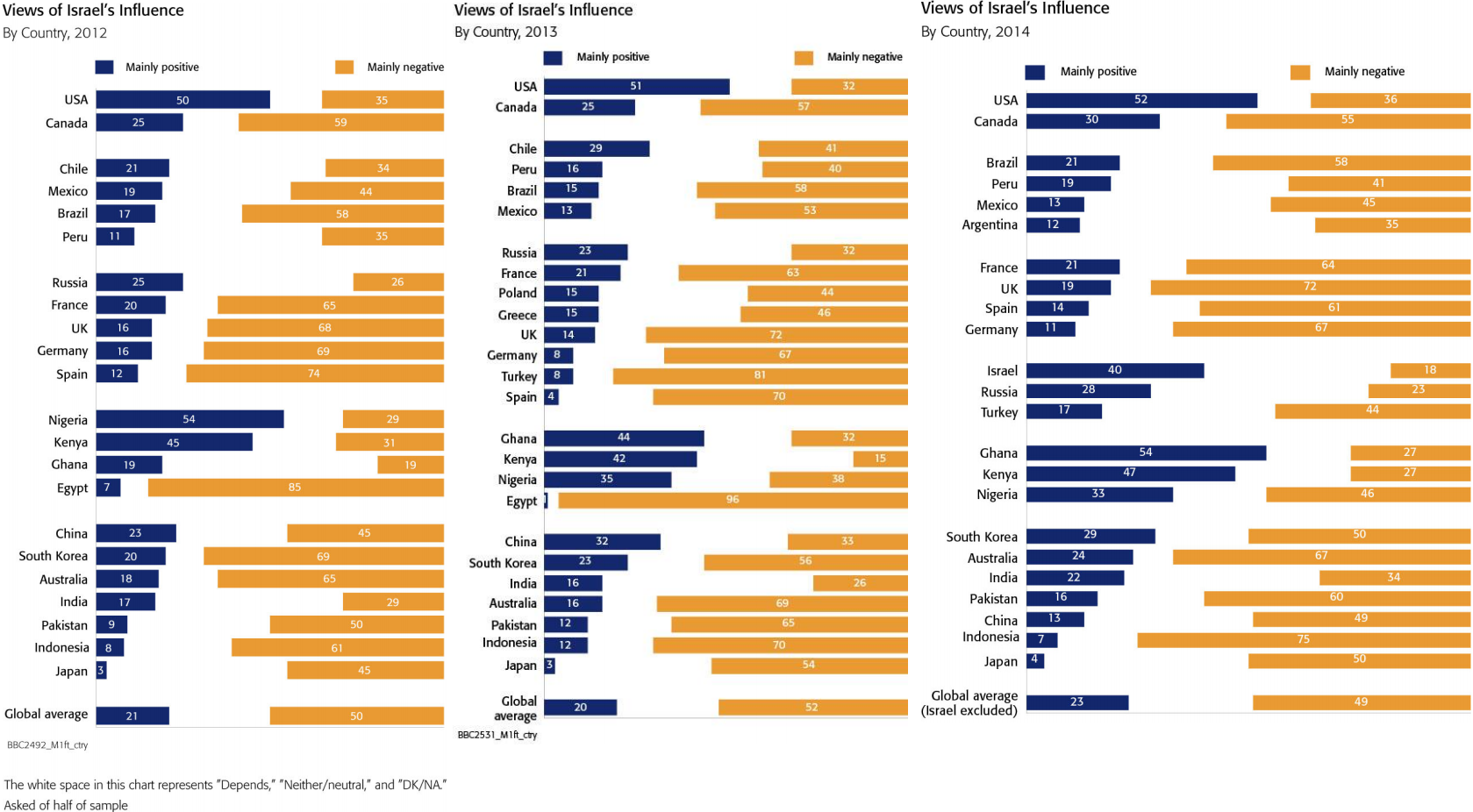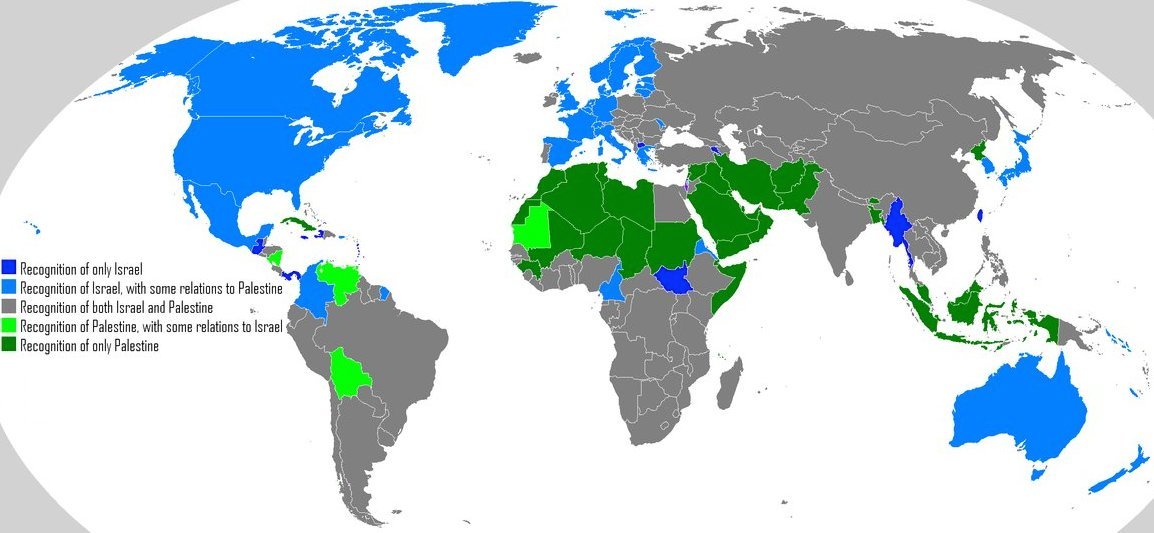This isn't true. Netanyahu and his ilk have made it so that Israel only holds majority support in US and parts of Africa (mostly having to do with aid or because they also deal with terrorism).
How the world sees Israel, in one chart
Updated by Zack Beauchamp on July 29, 2014, 1:20 p.m. ET @zackbeauchamp zack@vox.com
There've been demonstrations around the world over the war between Israel and Hamas, often against Israel's role in the conflict. So clearly some people feel strongly about the issue, but what does everyone else think? There's data to help answer this. A regular BBC World Service poll on international views of Israel tells us a lot of interesting things about how the country is perceived and its place in the world.
The BBC poll asks people in 22 countries (plus, some years, a few others) whether they have a "mainly positive" or "mainly negative" view about a list of countries set by the BBC. Here are the results for Israel from the past three years — it's important to look at all of them, because the 2012 survey was conducted before Israel's generally unpopular 2012 aerial campaign in Gaza:

There's a lot to pick apart in here, but there are some obvious, consistent findings that are really interesting.
Most countries have a pretty dim view of Israel's influence on the world
In almost every country surveyed, over all three years, more people said they had a "mainly negative" than "mainly positive" view of Israel. This was true in every surveyed country in Asia, Europe, and South America.
The BBC lists a "global average" for each year that shows about two-to-one negative over positive views, although the poll does not specify whether this metric weights for country size.
Israel is viewed most positively in the United States and sub-Saharan Africa
It's well known that Israel polls well inside the United States (here's why). But Israel's relatively strong numbers in Ghana and Kenya, as well as its strong result in Nigeria in 2012, might be more surprising.
There's a few potential explanations. One is that, shortly after Israel's founding, the country made a concerted effort to reach out to sub-Saharan African states. Israel, as University of Ghana political scientists Kwame Boafo-Arthur and E. Gyimah-Boadi explain, was a vocal supporter of decolonization in the 1950s and an early and enthusiastic provider of foreign aid.
This relationship soured in the 70s and 80s over Israeli support for apartheid South Africa and conflict with Arab states, but Boafo-Arthur and Boadi see a general trend towards improved relations between Israel and African states in the post-Cold War era. About 40 African states either reopened shuttered relations with Israel or established them for the first time, and sub-state economic ties flourished.
Another potential explanation is more specific to some of the countries in the poll. Both Kenya and Nigeria face serious threats from Islamist militant groups (al-Shabaab and Boko Haram, respectively). This might make them more sympathetic to nations, like Israel, taking aggressive military actions against what they might see as similar threats. Indeed, Kenya and Nigeria are among a small handful of countries around the world whose publics have a net-positive view of America's drone program.
Public sentiment about Israel doesn't seem to determine a country's Israel-Palestine policy
While most publics may broadly see Israel negatively, that is not always reflected in government policy. This map, which shows which countries have formal diplomatic relations with just with Israel (blue), just with Palestine (green), or both (grey), is a rough barometer for how governments approach the conflict:

Saint Tepes/Wikimedia Commons
The pattern among countries in Europe and the Pacific are particularly striking. These countries' citizens tend to be pretty critical of Israel. French people, for example, hold negative views of Israel over positive by a three-to-one margin. Yet their governments have full diplomatic relations with Israel and do not recognize Palestine as an independent country. The reasons for that are complex and have to do with views of how to adjudicate the conflict as much as with international politics, but the point is that popular views of Israel do not necessarily predict government policy on Israel-Palestine.
This country is a fukking joke, we have more of a positive view of Israel than Israel does of itself

 I love how you devils try to pretend those fake Jews and white people aren't the same. It's laughable.
I love how you devils try to pretend those fake Jews and white people aren't the same. It's laughable.

 definitely shortened the war. Before we officially entered the fray we were supplying aid to both England and Russia by providing weaponry. Once we did enter the war Germany's defeat within a few years was assured. Historians agree Germany would have never been able to beat Russia no matter what (I somewhat disagree with that assessment) but a longer war would have meant the elimination of pretty much all Jews in Europe. Israel should be forever grateful and humble towards us. Russia and Britain as well but they don't seem to go out of their way to mindlessly serve Israel interests.
definitely shortened the war. Before we officially entered the fray we were supplying aid to both England and Russia by providing weaponry. Once we did enter the war Germany's defeat within a few years was assured. Historians agree Germany would have never been able to beat Russia no matter what (I somewhat disagree with that assessment) but a longer war would have meant the elimination of pretty much all Jews in Europe. Israel should be forever grateful and humble towards us. Russia and Britain as well but they don't seem to go out of their way to mindlessly serve Israel interests.